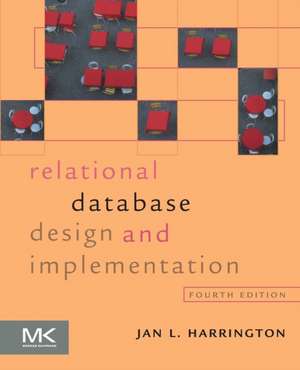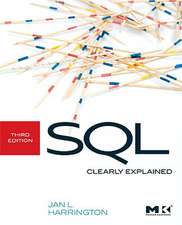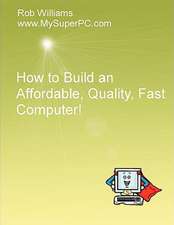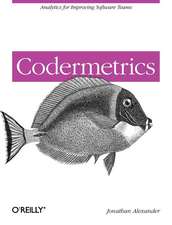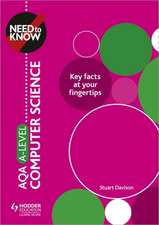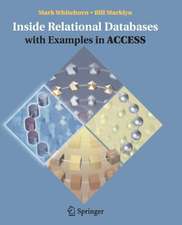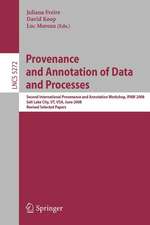Relational Database Design and Implementation
Autor Jan L. Harringtonen Limba Engleză Paperback – 27 apr 2016
Database systems underlie the large majority of business information systems. Most of those in use today are based on the relational data model, a way of representing data and data relationships using only two-dimensional tables. This book covers relational database theory as well as providing a solid introduction to SQL, the international standard for the relational database data manipulation language.
The book begins by reviewing basic concepts of databases and database design, then turns to creating, populating, and retrieving data using SQL. Topics such as the relational data model, normalization, data entities, and Codd's Rules (and why they are important) are covered clearly and concisely. In addition, the book looks at the impact of big data on relational databases and the option of using NoSQL databases for that purpose.
- Features updated and expanded coverage of SQL and new material on big data, cloud computing, and object-relational databases
- Presents design approaches that ensure data accuracy and consistency and help boost performance
- Includes three case studies, each illustrating a different database design challenge
- Reviews the basic concepts of databases and database design, then turns to creating, populating, and retrieving data using SQL
Preț: 280.20 lei
Preț vechi: 399.84 lei
-30% Nou
Puncte Express: 420
Preț estimativ în valută:
53.62€ • 55.64$ • 44.82£
53.62€ • 55.64$ • 44.82£
Carte tipărită la comandă
Livrare economică 08-22 martie
Livrare express 11-15 februarie pentru 107.21 lei
Preluare comenzi: 021 569.72.76
Specificații
ISBN-13: 9780128043998
ISBN-10: 0128043997
Pagini: 712
Dimensiuni: 191 x 235 x 38 mm
Greutate: 1.43 kg
Ediția:4
Editura: ELSEVIER SCIENCE
ISBN-10: 0128043997
Pagini: 712
Dimensiuni: 191 x 235 x 38 mm
Greutate: 1.43 kg
Ediția:4
Editura: ELSEVIER SCIENCE
Cuprins
Part I: Introduction
1. The Database Environment
2. Systems Analysis and Database Requirements
Part II: Relational database design theory
3. Why Good Design Matters
4. Entities and Relationships
5. The Relational Data Model
6. Relational Algebra
7. Normalization
8. Database Design and Performance Tuning
9. Codd’s Rules for Relational DBMSs
Part III: Relational database design practice
10. Introduction to SQL
11. Using SQL to Implement a Relational Design
12. Using CASE Tools for Database Design
13. Database Design Case Study #1: Mighty-Mite Motors
14. Database Design Case Study #2: East Coast Aquarium
15. Database Design Case Study #3: SmartMart
Part IV: Using interactive SQL to manipulate a relational database
16. Simple SQL Retrieval
17. Retrieving Data from More Than One Table
18. Advanced Retrieval Operations
19. Working With Groups of Rows
20. Data Modification
21. Creating Additional Structural Elements
Part V: Database implementation issues
22. Concurrency Control
23. Database Security
24. Data Warehousing
25. Data Quality
Part VI: Beyond the relational data model
26. XML Support
27. Object-Relational Databases
28. Relational Databases and “Big Data: The Alternative of a NoSQL Solution
Part VII: Appendices
A. Historical Antecedents
B. SQL Programming
C. SQL Syntax Summary
1. The Database Environment
2. Systems Analysis and Database Requirements
Part II: Relational database design theory
3. Why Good Design Matters
4. Entities and Relationships
5. The Relational Data Model
6. Relational Algebra
7. Normalization
8. Database Design and Performance Tuning
9. Codd’s Rules for Relational DBMSs
Part III: Relational database design practice
10. Introduction to SQL
11. Using SQL to Implement a Relational Design
12. Using CASE Tools for Database Design
13. Database Design Case Study #1: Mighty-Mite Motors
14. Database Design Case Study #2: East Coast Aquarium
15. Database Design Case Study #3: SmartMart
Part IV: Using interactive SQL to manipulate a relational database
16. Simple SQL Retrieval
17. Retrieving Data from More Than One Table
18. Advanced Retrieval Operations
19. Working With Groups of Rows
20. Data Modification
21. Creating Additional Structural Elements
Part V: Database implementation issues
22. Concurrency Control
23. Database Security
24. Data Warehousing
25. Data Quality
Part VI: Beyond the relational data model
26. XML Support
27. Object-Relational Databases
28. Relational Databases and “Big Data: The Alternative of a NoSQL Solution
Part VII: Appendices
A. Historical Antecedents
B. SQL Programming
C. SQL Syntax Summary
